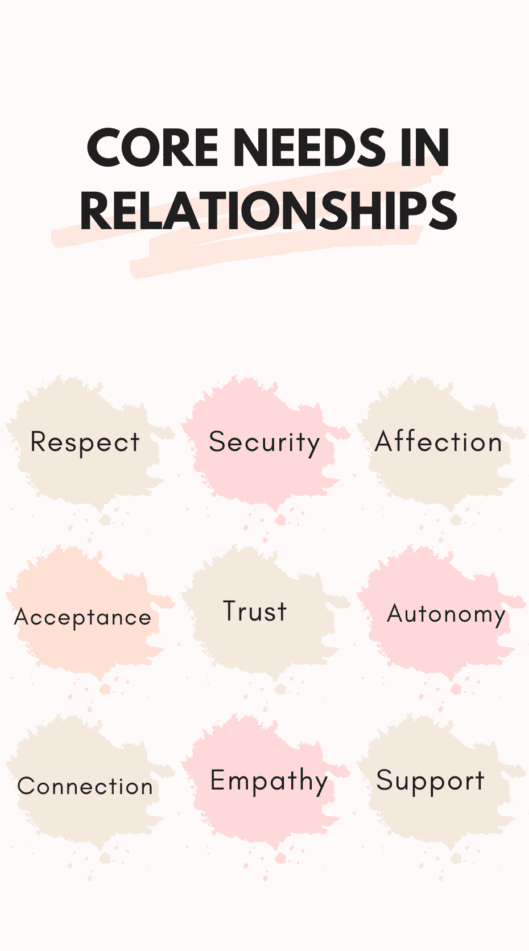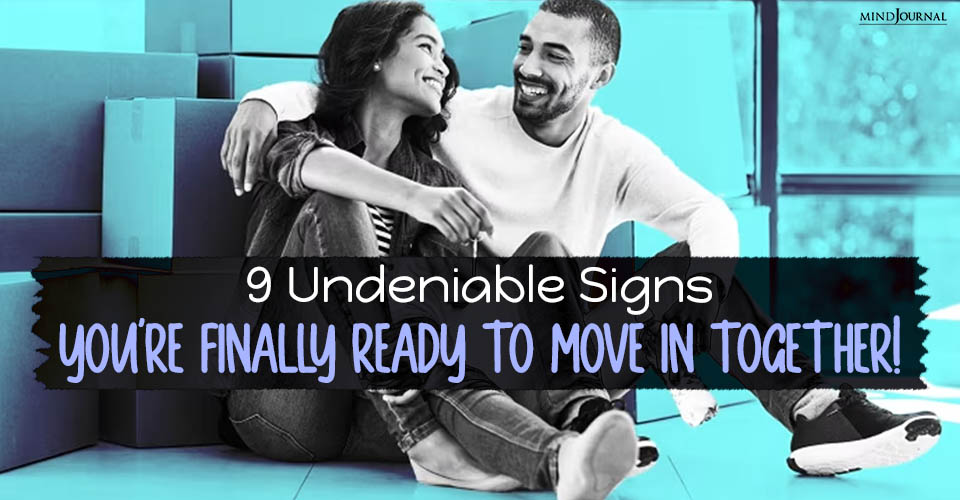Like gardens need care and attention to thrive, there are core needs in a relationship that are essential elements that keep them healthy and strong.
From trust and communication to shared goals, let’s dive into what really keeps our bonds strong. Let’s break them down into simple points so you can understand them better.
What Are Core Needs In A Relationship:
Core relationship needs refer to the fundamental emotional, psychological, and social requirements that individuals seek to fulfill in their relationships with others. These needs play a crucial role in forming and maintaining healthy and satisfying relationships.
Read more here: How To Identify Your Core Values and Live By Them
While the specific needs may vary from person to person, some common core relationship needs include:
6 Emotional Needs In A Relationship
- Affection: Think of this as the warm sunshine in your relationship garden. It’s about those sweet gestures that make you feel loved, the words of affection that reassure you, and the intimate connection you share.
- Respect: Imagine respect as the sturdy roots of your relationship tree. It means valuing each other’s thoughts and feelings, considering them important, and treating each other’s viewpoints with care.
- Appreciation: This is like the refreshing rain that nurtures your relationship garden. It’s all about showing gratitude and giving praise for the little things your partner does. It’s kinda like saying, “Hey, I see what you’re doing and I appreciate it.”
- Security: Just like a strong fence around your garden, security in a relationship means feeling safe both physically and emotionally. It’s about knowing that you can be yourself without fear of judgment or harm.
- Loyalty: Picture loyalty as the vibrant flowers that bloom in your relationship garden. It’s the faithfulness you have towards each other, being there through thick and thin, and standing by each other’s side.
- Trust: Trust is like the fertile soil that helps your relationship garden grow. It’s the foundation built on transparency, openness, and honesty in every aspect of your lives together.
Some other include:
- Connection
- Empathy
- Support

Read more here: Why You Need To Accept Your Partner’s Needs
How to Determine Your Core Needs In A Relationship?
Understanding and articulating your core relationship needs is crucial for your well-being and the health of your partnership. Here’s how to get started:
1. Identify Your Love Language
Gary Chapman’s concept of love languages can be immensely helpful in identifying how you express and receive love.
These languages—Words of Affirmation, Acts of Service, Receiving Gifts, Quality Time, and Physical Touch—reveal your unique preferences for experiencing affection
Understanding your love language can provide insight into your emotional needs in a relationship and help you communicate them effectively to your partner.
2. Reflect on Your Emotions
Pay attention to what triggers strong emotions within you. Take note of situations or behaviors that make you happy, content, upset, or frustrated. This reflection can help you pinpoint the aspects of your relationship that are particularly significant to you and contribute to your core needs.
3. Explore Your Personal History
Your upbringing and past experiences shape your expectations and desires within a relationship. Reflect on your childhood, past relationships, and significant life events to uncover patterns and themes that might shed light on your core relationship needs.
How To Communicate Your Needs?
Identifying your core needs in a relationship is just the first step; effective communication with your partner is essential for building a strong, fulfilling connection.
1. Start the Conversation
Initiating a conversation about your core needs requires vulnerability and openness. Choose a comfortable setting and time when both you and your partner are relaxed and receptive.
2. Use “I” Statements
Frame your needs using “I” statements to avoid sounding accusatory or confrontational. For instance, say, “I feel loved and appreciated when we spend quality time together,” instead of “You never spend time with me.”
3. Listen Actively
Communication is a two-way street. While expressing your needs, also encourage your partner to share their needs and feelings. Listen actively without interrupting, and show empathy and understanding.
4. Collaborate on Solutions
Collaborate to discover methods for fulfilling each other’s requirements. Compromise and flexibility are key. Keep in mind that these needs might evolve over time, so ongoing communication is vital.
Final Words: Nurturing a Fulfilling Relationship
Understanding and addressing relationship needs is the cornerstone of a thriving partnership. While these needs have a universal foundation, they can indeed manifest differently from person to person.
By identifying your love language, reflecting on the 6 emotional needs in a relationship and personal history, and engaging in open communication, you can create a strong bond with your partner based on trust, mutual understanding, and respect.
Read more here: 5 Core Truths about Relationships That All Married Couples Need to Understand
Remember, relationships are a journey of growth and discovery. As you and your partner continue to evolve, your core needs might also change.










Leave a Reply